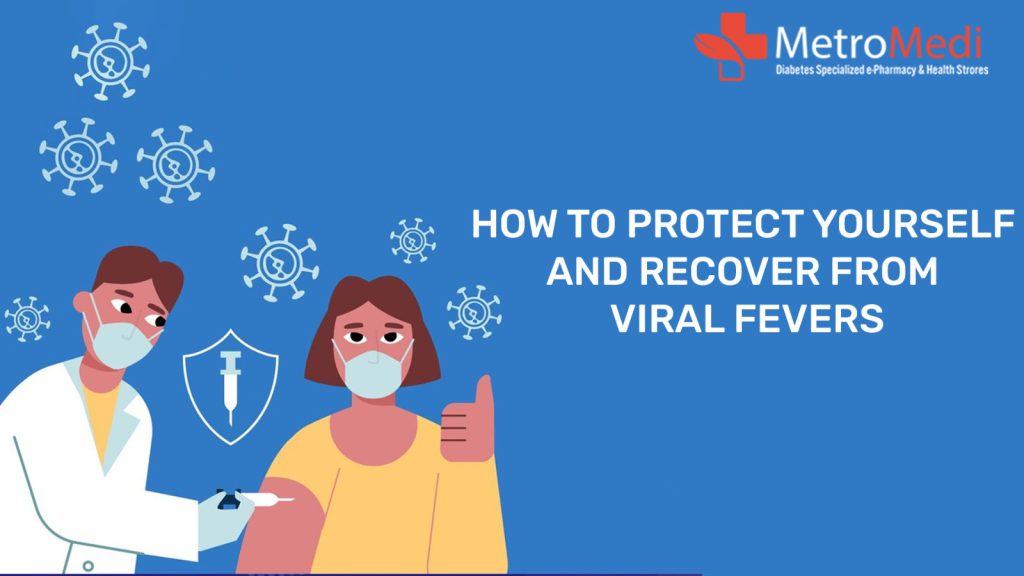
Viral fevers are common illnesses caused by various viruses, leading to high body temperatures, fatigue, muscle aches, and other uncomfortable symptoms. While these fevers are typically self-limiting and resolve on their own, it is crucial to take steps to protect yourself and understand how to cure viral fever effectively. Additionally, knowing when to seek help, such as through an online doctor consultation or a free online doctor consultation, can be very beneficial. Here’s a comprehensive guide on how to protect yourself and recover from viral fevers.
Understanding Viral Fevers
A viral fever is an increase in body temperature due to a viral infection. These infections can be caused by various viruses, including those responsible for the flu, common cold, and other respiratory illnesses. The body’s immune response to these viral infections typically leads to fever as it attempts to fight off the invading pathogens. Can viral fever last for 7 days? Yes, viral fevers can sometimes last up to a week or longer, depending on the virus and the individual’s immune response.
Symptoms of Viral Fevers
Common symptoms of viral fevers include:
- High body temperature (above 100.4°F or 38°C)
- Chills and sweating
- Headache
- Muscle and joint pains
- Fatigue and weakness
- Sore throat and cough
- Runny or stuffy nose
- Nausea or vomiting
How to Protect Yourself from Viral Fevers
Prevention is always better than cure. Here are some effective ways to protect yourself from viral fevers:
1. Practice Good Hygiene
- Wash Your Hands Regularly: Use soap and water to wash your hands thoroughly for at least 20 seconds. If soap and water are not available, use an alcohol-based hand sanitizer.
- Avoid Touching Your Face: Viruses can enter your body through the eyes, nose, and mouth. Avoid touching your face with unwashed hands.
- Cover Your Mouth and Nose: When coughing or sneezing, use a tissue or your elbow to prevent the spread of germs.
2. Maintain a Healthy Lifestyle
- Boost Your Immune System: Eat a balanced diet rich in fruits, vegetables, whole grains, and lean proteins. Regular exercise, adequate sleep, and staying hydrated are also crucial for a healthy immune system.
- Stay Hydrated: Drinking plenty of fluids helps maintain a strong immune system and can flush out toxins from your body.
- Get Vaccinated: Vaccines like the flu shot can protect you against specific viruses that cause fevers. Consult your healthcare provider about which vaccines are right for you.
3. Avoid Close Contact with Sick People
- Practice Social Distancing: Avoid close contact with individuals who are sick or showing symptoms of viral infections.
- Stay Home When You’re Sick: If you’re feeling unwell, it’s best to stay home to avoid spreading the virus to others.
If you do contract a viral fever, here are steps you can take to help your body recover:
1. Rest
- Get Plenty of Sleep: Rest is crucial when you’re sick. Your body needs energy to fight off the virus, and sleep is one of the best ways to facilitate this process.
- Limit Physical Activity: Avoid strenuous activities and allow your body to heal.
2. Stay Hydrated
- Drink Fluids: Drink water, herbal teas, and clear broths to stay hydrated. Fever can cause dehydration, so it’s important to replenish lost fluids.
- Avoid Caffeinated Drinks and Alcohol: These can lead to dehydration and may exacerbate symptoms.
3. Manage Symptoms
- Use Over-the-Counter Medications: Medications like acetaminophen or ibuprofen can help reduce fever and alleviate pain. Always follow the dosage instructions and consult your healthcare provider if you have any concerns.
- Apply Cool Compresses: A cool, damp washcloth applied to the forehead can help lower body temperature and provide relief from fever.
4. Monitor Your Condition
- Keep an Eye on Symptoms: If your symptoms worsen or you develop new symptoms, seek medical attention promptly. Prolonged fever, difficulty breathing, or severe pain should be evaluated by a healthcare professional.
5. Seek Medical Advice
- Consult a Healthcare Provider: If you have underlying health conditions or are unsure about your symptoms, it’s best to consult a healthcare provider. Online doctor consultations or free online doctor consultations can be convenient options to get professional advice without having to leave your home. They can provide guidance on managing your condition and may prescribe antiviral medications if necessary.
When to See a Doctor
While most viral fevers can be managed at home, there are situations when you should seek medical attention:
- High Fever: If your fever exceeds 103°F (39.4°C) or persists for more than seven days, it’s time to see a doctor.
- Severe Symptoms: Difficulty breathing, chest pain, persistent vomiting, or confusion warrant immediate medical attention.
- Pre-existing Conditions: Individuals with chronic illnesses, weakened immune systems, or pregnant women should consult a doctor promptly if they develop a fever.
Conclusion
Viral fevers can be unpleasant, but with the right precautions and care, you can protect yourself and recover effectively. Remember to practice good hygiene, maintain a healthy lifestyle, and stay vigilant about your health. If you do fall ill, rest, hydration, and proper symptom management are key to a speedy recovery. Always consult a healthcare provider if you have concerns about your symptoms or overall health. Online doctor consultations are a great resource to consider for immediate advice and care. Stay healthy and take care!
